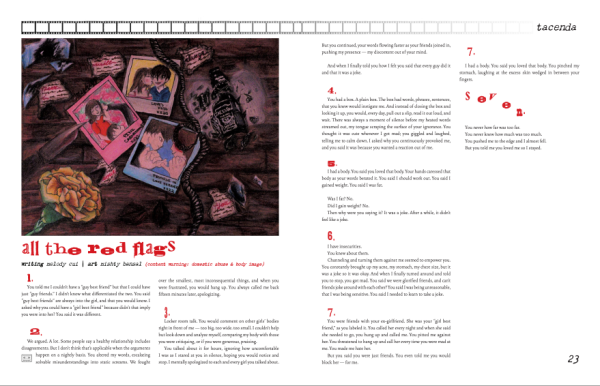From the idea of true love to the glamorization of toxic relationships, love has historically been portrayed in various ways through novels and song lyrics. Alt-pop artist Lana Del Rey’s lyricism is a prime example, with many of her songs romanticizing abusive relationships. Her music has surged in popularity on TikTok, with people posting videos using her songs “Let The Light In (feat. Father John Misty)” and “Margaret,” to highlight their personal experiences with toxic relationships.
Senior Jewell Ralston is an avid fan of Del Rey and states that although her depiction of love may be toxic, this makes her music more relatable. She specifically enjoys Del Rey’s “National Anthem” and “Norman f***ing Rockwell,” citing the song’s lyrics “‘Cause you’re just a man / It’s just what you do.” While these lines are pessimistic, Ralston deeply resonates with their unambiguous meaning. She also praises indie artist Mitski for her portrayal of toxic relationships in “Me and My Husband” and objectification in “Liquid Smooth,” citing how the lyrics in both tracks stand out to her as extremely relatable.
“With each of their music, love is portrayed in different ways,” Ralston said. “It’s really hard to say what it is at a surface level. With Lana, she does the perfect amount of symbolism and what really attracts me is that the heartbreak aspect of love is really relatable. Whether it’s heartbreak or first love, the songs that I really can relate to are Mitski’s because she talks about how in love she is and how terrible love is at the same time.”
Ralston resonates with sadder music because she finds comfort in its lyricism, describing how Del Rey’s and Mitski’s music comforted her when she struggled with heartbreak and depressive episodes culminating out of her experiences with love. The concept of relatability has inspired many of ‘23 alum Melody Cui’s poems, amongst which is “All the Red Flags.” Detailing various red flags in a toxic romantic relationship, Cui also depicts the manipulation that convinces the narrator to stay in the relationship with their abuser. She states that she rarely writes about love, yet she chose this topic as an attempt to express herself in a way that relates to those who have faced similar experiences in their relationships.

“There’s not really a takeaway from this piece — it’s intended to have your feelings validated,” Cui said. “When I write about emotional things, specifically about relationships for this piece, it’s a way for me to connect with other people. I feel like that’s true for a lot of writing, where you read pieces to see your personal experiences and emotions written into words for you to conceptualize better.”
Literature teacher Randy Holaday sees a similar pattern with relatability in the texts he teaches, specifically when comparing students’ enjoyment of Shakespeare’s “Romeo and Juliet” with Benjamin Alire Sáenz’s “Aristotle and Dante Discover the Secrets of the Universe.” Holaday states that students tend to enjoy Alire Sáenz’s novel more than the Shakespearean play, as they resonate more with its modern themes and can apply its takeaways to their familial and romantic relationships. On the other hand, students are typically dissatisfied with “Romeo and Juliet” due to the play’s depiction of love in an unrealistic light, ranging from the characters’ young age to their fast-paced relationship.
“‘Aristotle and Dante Discover the Secrets of the Universe’ is more inclusive, both racially and in terms of sexual identity and culture,” Holaday said. “It’s more relevant because it looks much closer to the relationships that students have in their own lives and it’s also just a healthier relationship that’s being presented. Their relationship develops over two years, it doesn’t immediately jump into a toxic back-and-forth drama. The book is mainly about one person and their identity being explored, including relationships. So I think it just depicts a much more realistic version of love and is a better model.”
Holaday also teaches Shakespearean sonnets in his AP Literature class, and states that many students do not take the sonnets seriously due to their pro-patriarchal sentiments. He cites “Sonnet 1,” “Sonnet 20” and “Sonnet 130” in particular, as he finds that the language of these sonnets objectifies the speaker’s beloved.
“They’re pretty problematic,” Holaday said. “They were written right at the end of the 16th century so in terms of patriarchal attitudes towards women, their only service is in being the objects of love for the speaker. This is a male character, and even though there’s some gender ambiguity, all he’s doing is putting this guy in the place of a woman and talking about him in terms of objectification and beauty, essentially asking ‘What can you do for me? I hope you’ll have sex with me.’”
Themes of objectification also bleed into rap music, with junior Nirbhay Saluja noting that artists like rapper Travis Scott and R&B artist The Weeknd tend to objectify women in their songs. However, Saluja states that these artists’ lyricism often broadens into a criticism of how love impacts them, with Scott’s “I KNOW ?” following his drunken desire to have sex with a past lover.
While Saluja believes the song is toxic, it is ultimately a depiction of how Scott’s experiences and societal toxicity have influenced him to act a certain way when it comes to love, spreading awareness rather than glamorizing toxicity. While Ralston acknowledges the harmful nature of toxic lyricism, she agrees with Saluja’s understanding of the true meaning behind many of these songs and says this subcategory of music is ultimately intended to shed light on the reality of romantic relationships.
“I don’t think it’s problematic for love to be depicted this way,” Ralston said. “You can’t always express the good parts of love in your life because love isn’t always going to be positive and it’s not always going to be the sunshine and rainbows that you expect. You can’t fall in love without having these hardships and without having these experiences.”










